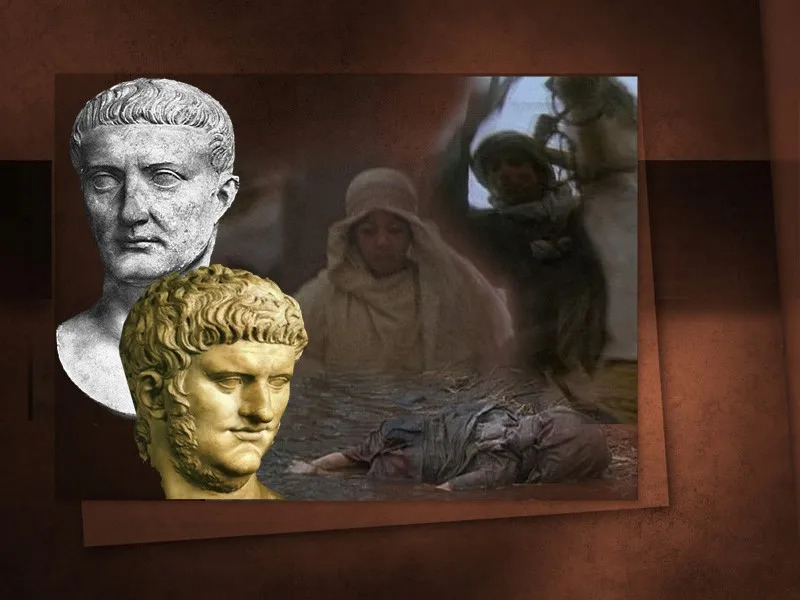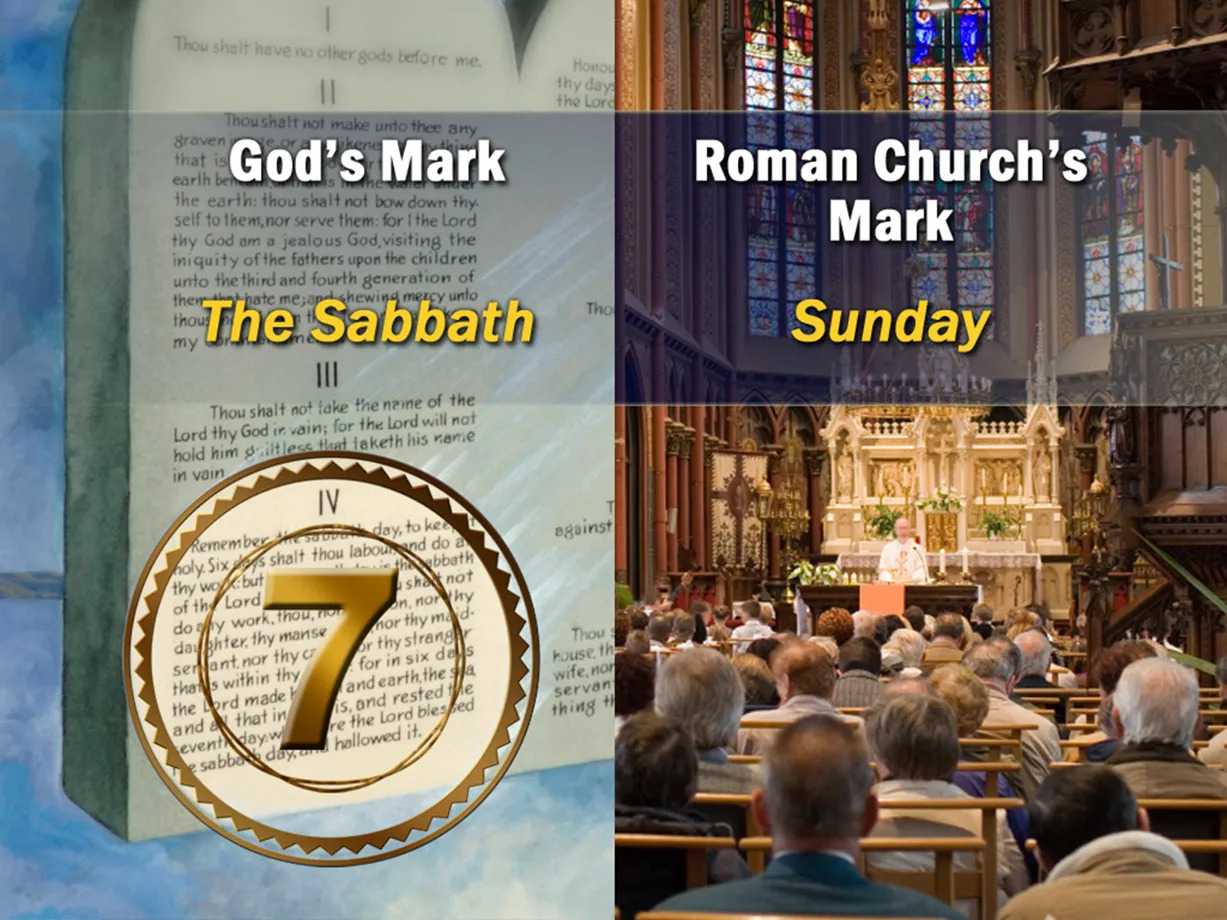
By Pastor Aubrey Duncan
A Much Debated Bible Prophecy
It is perhaps the most frequently discussed Biblical doctrine today. Not only is this topic eminent in religious circles; but even the non-religious speculate and make determinations as to what the Mark of the Beast is and its ramifications for society. Regardless of whether you are religious or non-religious, Christian or of any other religious persuasion, you will be affected by the Mark of the Beast. The Holy Bible, the source that introduces the concept of the Mark of the Beast, clearly identifies what the beast is. It further portrays the beast boldly proclaiming to the entire world what its mark is, and what the consequences are for receiving or not receiving it. John the Revelator records: “And he causeth all, both small and great, rich and poor, free and bond, to receive a mark in their right hand, or in their foreheads: And that no man might buy or sell, save he that had the mark, or the name of the beast, or the number of his name” (Revelation 13:16–17).
Many theologians and self-described prophets have attempted to identify the Mark of the Beast. Almost universally, they have concluded that it is some kind of micro computer chip, sophisticated electronic device, or a tattoo that would be implanted in the forehead and/or on the right hand. Unfortunately, this is what most of Christendom and the rest of the world have accepted as ‘truth’. But what does the Bible, the only source of Truth in which the Mark of the Beast is not only introduced but thoroughly discussed, have to say about the matter?
Biblical Authenticity
In order to correctly determine what the Mark of the Beast is, one must first discover, from the Bible, what is the Beast. The Biblical prophet Daniel foretold the nations that would, from his time in Babylonian captivity to the second coming of Jesus, rule the world and have an impact on God’s plan of redemption for human souls. In his God-inspired prophetic vision, Daniel identified those nations in the imagery of beasts. In the seventh chapter of his exposition, he plainly explained what a beast is: “These great beasts, which are four, are four kings, which shall arise out of the earth” (Daniel 7:17). Every king has a kingdom. So God’s prophet is not referring to individuals, but rather to the kingdoms over which they rule.

First, the prophet depicts Babylon, the empire in which he was a captive, as a lion with eagle’s wings (Daniel 7:4). The historical record testifies that the Babylonian empire, under its leader Nebuchadnezzar, invaded and captured the Jewish nation in the year 606 BC. Their dominance lasted for seventy years, until 536 BC. Daniel then foretold the empire that would wrest control from Babylon and then rise to world rulership. It was the Medes and Persians. This was in direct fulfillment of earlier prophecies given by the prophet Jeremiah, who not only predicted how long Babylon would rule but also named the nation that would follow it (Jeremiah 25:11–12; 51:11). Daniel pictured that successive entity as a bear with three ribs in its mouth. Its conquest of the then-known world was to last from 536 BC to about 331 BC. History confirms that that nation was the Media/Persia empire.
Next, using the imagery of a leopard with four wings on its back and having four heads, Daniel foretold of the Grecian empire. This portrayal aptly described the Grecian empire under the leadership of the young military genius, Alexander the Great. He defeated Darius III, king of Persia, at the Battle of Arabella in the fall of 331 BC. Alexander accomplished this feat with unimaginable swiftness (wings) and amazingly unheard-of military tactfulness. Upon his death at the tender age of 33, his empire was divided among his top four generals (four heads): Ptolemy Lagus, Cassander, Lysimachus, and Seleucus Nicator (Daniel 7:6).
What Daniel predicted next is quite intriguing. He described a beast that, unlike the previous ones, had no features of any creature in the natural world. The prophet presented a dominating, seemingly unconquerable power that devoured and ruled with determined ruthlessness. It was simply unstoppable (Daniel 7:7). This is a fitting characterization of the invincible Roman Empire, which arose to overtake Greece around 168 BC. Rome’s conquest and domination of the previous empires is legendary. Rather than being conquered by another nation, Daniel prophesied that it would break into ten divisions. Out of those ten states, which he classified as horns, Daniel foreshadowed a little horn that would arise. He informs us that this little horn would develop into a political/religious behemoth that would dominate European space and project its influence around the planet. This little horn was already growing in power and influence by the time the Imperial Roman Empire finally disintegrated around 476 AD. That is the Roman Papacy.
John the Revelator picks up the story and interjects another beast that would arise after the seeming demise of the Roman Papacy. He described this as a two-horned, Lamb-like beast that would behave like a dragon. This entity is none other than the United States of America (Revelation 13:11-17). Further, John foretold that this lamb-like beast would join forces with the revived Roman Papacy to enforce the Mark of the Beast.
Identifying the Beast
Having delineated their successive rulerships, both Daniel and John focused on the fourth beast, the Pagan Roman Empire, and its transformation from Imperial Rome to Papal Rome. Next, they foreshadowed the part this massive European Ecclesiastical Establishment would play on the world stage in the Drama of the Ages. That role, they predicted, would be opposing the program of the Creator God while claiming to represent Him. Daniel explained: “The fourth beast shall be the fourth kingdom upon earth, which shall be diverse from all kingdoms, and shall devour the whole earth, and shall tread it down, and break it in pieces … And he shall speak great words against the most High, and shall wear out the saints of the most High, and think to change times and laws: and they shall be given into his hand until a time and times and the dividing of time” (Daniel 7:23–25).
Historian Will Durant writes of Daniel’s fourth beast: “When Christianity conquered Rome, the ecclesiastical structure of the pagan church, the title and vestments of the Pontifex Maximus, the worship of the Great Mother goddess and a multitude of comforting divinities … the joy and solemnity of old festivals, and the pageantry of immemorial ceremony, passed like maternal blood into the new religion, and captive Rome captured her conqueror. The reigns and skills of government were handed down by a dying empire to a virile Papacy. The lost power of the broken sword was reclaimed by the magic of the consoling word. The armies of the state were replaced by the missionaries of the church, moving in all directions along the Roman roads, and the revolted provinces, accepting Christianity, again acknowledged the sovereignty of Rome. The church, with the shadow of ancient authority behind it, was the only symbol left of imperial Rome. Its bishop, the pope of Rome, was the city’s only recourse for leadership and protection. The Roman Empire in Europe would be replaced by the spiritual empire, which came to be temporal as well, whose reigning seigneur was the bishop of Rome” (Caesar and Christ, page 672).
Another historian, H.G. Guinness, in total agreement with Will Durant, sums it up: “The leading objects which the Roman pontiffs had steadily pursued for centuries seemed at last attained: independent sovereignty, absolute control over the Christian Church, and full control over the princes of Europe. The power of the Caesars lived again in the universal dominion of the popes” (Romanism and the Reformation, page 12).
The historical record, confirming the Biblical prophecy of the transition from Imperial Rome to Papal Rome, is undeniable. Exactly as Daniel prophesied, the Roman church deceptively but boldly claims to be God’s representative on earth. In attempting to take upon itself the prerogatives of God, it has persecuted and slaughtered more than fifty million souls who refused to accept her usurpation of the God of all creation. Central to that illegal seizure of sovereign power, the church makes the blasphemous claim of changing God’s holy Sabbath-day from the seventh day of the week to the first.

The God of all creation lovingly admonishes all humanity: “Remember the Sabbath day, to keep it holy. Six days shalt thou labour, and do all thy work: But the seventh day is the Sabbath of the Lord thy God: in it thou shalt not do any work, thou, nor thy son, nor thy daughter, thy manservant, nor thy maidservant, nor thy cattle, nor thy stranger that is within thy gates: For in six days the Lord made heaven and earth, the sea, and all that in them is, and rested the seventh day: wherefore the Lord blessed the Sabbath day, and hallowed it” (Exodus 20:8–11).
But the beast (little horn) of end-time prophecy boastfully proclaims: “Perhaps the boldest thing, the most revolutionary change the church ever did happened in the first century. The holy day, the Sabbath, was changed to Sunday … not from any directions noted in Scriptures, but from the church’s sense of its own power … People who think that the Scriptures should be the sole authority, should logically become Seventh-day Adventists, and keep Saturday holy” (Saint Catherine Catholic Church Sentinel, May 21, 1995).
The Beast proclaims its Mark
She is not shy but rather proud of claiming to change God’s Seventh-day Sabbath from the seventh day of the week to the first. Sunday sacredness is derived from antiquity’s pagan practices, and is not found in the Bible. This doctrine has been passed on like maternal blood and accepted by most of Christendom. The Roman Catholic Papacy claims that the tradition of Sunday sacredness is her Mark of Authority. Further, it boastfully asserts that anyone who honors Sunday is not following the God of Creation; but rather doing her bidding.
The following statements are evidence of those claims. They illustrate the significance that the church attaches to that alleged change. She makes it plain for all to see:
“Sunday is our Mark of Authority … the church is above the Bible, and the transference of Sabbath observance is proof of that fact.” (Catholic Record, Sept 1, 1923)
“Sunday is a Catholic Institution, and its claims to observance can be defended only on Catholic principles … From beginning to end of Scripture there is not a single passage that warrants the transfer of weekly public worship from the last day of the week to the first” (The Catholic Press, Sydney, Australia, August 1900).
It is well to remind the Presbyterians, Baptists, Methodists, and all other Christians, that the Bible does not support them anywhere in their observance of Sunday. Sunday is an institution of the Roman Catholic Church, and those who observe the day observe a commandment of the Catholic Church.” (Elizabeth, N.J. News, March 18, 1903).
Question: “Have you any other way of proving that the (Catholic) Church has power to institute festivals or precepts (to command holy days)?”
Answer: “Had she not such power, she could not have done that in which all modern religionists agree with her: She could not have substituted the observance of Sunday the first day of the week, for the observance of Saturday the seventh day, a change for which there is no Scriptural authority ”
(A Doctrinal Catechism, Stephen Keenan, page 176).
“Protestants accept Sunday rather than Saturday as the day for public worship after the Catholic Church made the change…but, the Protestant mind does not seem to realize that, in observing the Sunday, they are accepting the authority of the spokesman for the church, the pope” (Our Sunday Visitor, February 5, 1950.)
“We observe Sunday instead of Saturday because the Catholic Church transferred the solemnity from Saturday to Sunday” (A Doctrinal Catechism, Peter Geiermann, CSSR, 1957 edition, page 50).
“Protestantism, in discarding the authority of the (Roman Catholic) Church, has no good reasons for its Sunday theory, and ought logically to keep Saturday as the Sabbath” (American Catholic Quarterly Review, John Gilmar Shea, January 1883).
The current Pope emphasized, “On Sunday, our participation in the Eucharist has special importance. Sunday, like the Jewish Sabbath, is meant to be a day which heals our relationships with God, with ourselves, with others and with the world. Sunday is the day of the Resurrection, the “first day” of the new creation, whose first fruits are the Lord’s risen humanity, the pledge of the final transfiguration of all created reality. It also proclaims “man’s eternal rest in God”…The law of weekly rest forbade work on the seventh day, “so that your ox and your donkey may have rest, and the son of your maidservant, and the stranger, may be refreshed” (Ex 23:12). Rest opens our eyes to the larger picture and gives us renewed sensitivity to the rights of others. And so the day of rest, centered on the Eucharist, sheds it light on the whole week, and motivates us to greater concern for nature and the poor.” (Laudato SI, Section, 237).
My dear, loving Sunday-keeping Christians need to pay close attention.
The Holy Bible does not mention such an animal as a Jewish Sabbath, or Sunday as a day of rest centered on the Eucharist. How arrogant it is for someone to suggest substituting another day for God’s Sabbath, His sign of authority over His creation.
A Brief History of the Beast and its Mark
The fires of persecution set ablaze against the Christians by the sun-worshipping, Sunday-keeping Caesars served as the fuel that propelled the true Gospel throughout the Roman Empire. Severe slaughter did not, as they hoped, obliterate the religion of Christ and purge it from their empire. Despite the relentless harassment by Nero, Diocletian, and other Roman emperors, the pure, unadulterated Gospel of Jesus Christ continued to reach men’s hearts. The message of salvation through Jesus Christ turned many away from their pagan traditions, which were centered on sun worship. Penitent souls were pointed to a risen, sin-pardoning, loving Savior who bade them to enter his rest and to obey His commandments, the Sabbath commandment included.

Then came Constantine. Not unlike his predecessors, Constantine was a consummate sun worshiper. He exalted and paid homage to the Persian sun deity, Mithra. Mithraism was but one of the many pagan religions practiced throughout the empire. Like all of those pagan religions, Mithraism was centered on sun worship and accorded the highest honors to the first day of the week, today called Sunday. But, quite unlike his predecessors, Constantine recognized that opposition to the Christians was neither helping to strengthen his empire nor advance his purposes. He realized that hostility towards the growing Christian church was not diminishing its growth but rather strengthening it. Constantine chose, therefore, to adopt the policy of ‘If you can’t beat them, join them.’
His dedication to the first day of the week appealed to some Christians, particularly since Constantine claimed that his fight against his enemies was successful because of his vision of the cross and subsequent acceptance of the Christian religion. Those Christians, in an effort to separate themselves from the Jews, whom they thought of as evil because of the Jews crucifixion of Jesus Christ, embraced the idea of Sunday sacredness. It seemed to them a good thing to do in recognition and commemoration of Jesus’ resurrection.
With Constantine’s supposed conversion, the amalgamation of corrupt pagan practices with the pure religion of Jesus Christ was established. Not only were the religions of paganism and Christianity joined together, but also the state was joined to the now putrid faith. Constantine, as head of the Roman state, also became head of the newly amalgamated religion. He took upon himself the title of Pontifex Maximus, Supreme Pontiff. As a result of these and other similar actions, the true Christian faith started on its downward slide into apostasy.
Historian E.M. Chalmers writes, “These Gentile Christians of Rome and Alexandria began calling the first day of the week the Lord’s Day. This was not difficult for the pagans of the Roman Empire who were steeped in sun worship to accept, because they (the pagans) referred to their sun god as their Lord” (How Sunday came into the Christian Church, page 3).
The practice of sun worship became more intensely enforced and was codified into the state religion at the Church Council of Laodicea in 364 AD. The legislation read: “Christians shall not Judaize and be idle on Saturday (Sabbath), but shall work on that Day: but the Lord’s Day, they shall especially honour; and as being Christians, shall, if possible, do no work on that day. If, however, they are found Judaizing, they shall be shut out from Christ”. Sunday sacredness was progressively strengthened by subsequent church councils in 538 AD, 578 AD, and onward.
Such were the effects of Constantine’s purported conversion to the Christian faith. It brought in the lies and deceit of the devil and mingled them with the truth and holiness of God. Constantine planted the seed of the tree of knowledge of good and evil. That tree has grown and blossomed its fruit of Sunday sacredness into almost universal apostasy.
Noted historian Arthur Weigall enlightens us: “The church (Rome) made a sacred day of Sunday … largely because it was the weekly festival of the sun; for it was a definite Christian policy to take over the pagan festivals endeared to the people by tradition and give them Christian significance” (The Paganism in Our Christianity, page 145).
Walter Woodburn Hyde, another renowned historian, writes of this apostasy: “Remains of the struggle between the religion of Christianity and the religion of Mithraism are found in two institutions adopted from its rival by Christianity in the fourth century, the two Mithraic sacred days: December 25 dies natalis solis” (birthday of the sun) as the birthday of Jesus; and Sunday, the venerable day of the sun, as Constantine called it in his edict of 321 AD” (Paganism to Christianity in the Roman Empire, page 60).
Neither the God of creation nor any of his holy prophets, and most assuredly, not Jesus Christ, endorsed such a change from God’s Seventh-day Sabbath to the first day of the week, Sunday. Augustus Neander, another church historian, educates us in his classic account of church history: “The festival of Sunday, like all other festivals was always only a human ordinance and it was far from the intentions of the apostles to establish a Divine command in this respect, far from them, and from the early apostolic church, to transfer the laws of the Sabbath to Sunday”
(The History of the Christian Religion And The Church, page 186).
Sunday sacredness, which the Church of Rome claims as her mark of authority in religious matters, is the modern manifestation of sun worship. The recognition and legalization of Sunday as a holy day cannot save the planet, despite current widespread promotion. It is not honoring the God of Creation, but rather dishonoring Him. It is dishonoring Him by worshipping the creature instead of the creator.
Two Universal Appeals
It seems like the whole world is wondering after a man who, a little more than five years ago, was virtually unknown outside his native Argentina. Even his detractors admit to the potency of his persona. Presidents and Prime Ministers are seeking him out for advice. Politicians and Pundits are intrigued by him. Nobles and Statesmen are gravitating towards him. Diplomats and Despots are mesmerized by him. The press can’t seem to have enough of him. The common folk are flocking to him. Much of the religious world perceives him as something of a savior who can rescue the planet from its man-inflicted desecration and save the human family from its certain appointment with a destructive destiny. Francis’ appeal to the world to save humanity is centered around Sunday Sacredness.

As supreme head of one of the world’s largest and longest-surviving religious organizations, His Holiness, as so many call him, has amassed a treasure trove of goodwill capital. But on what will he spend it? How will America and the nations of the world respond when he ultimately spends that well-earned goodwill capital? God’s word predicts that he (or his successor) will spend it on the enforcement of the Mark of the Beast and Sunday sacredness. That’s when the universal legal proclamation goes forth to honor Sunday. We are witnessing the rapid approach of that day as the world is being programmed to accept Sunday as sacred in order to save the planet and mitigate humanity’s woes.
Claiming to make Sunday holy in respect of Jesus’ resurrection and the attempt to honor it to save the planet are Rome’s inventions and not the word of God. These are cunning devices of the Roman Papacy designed to usurp the commandment of God to honor Him by keeping holy His blessed Sabbath day. Only a Holy God can make a day holy. The day He has made holy is the 7th day Sabbath, today called Saturday. Nowhere in God’s word does He vaguely suggest or explicitly command that His people keep a day in honor of the resurrection of Jesus Christ. Nor do the Holy Scriptures in any way admonish us to honor Sunday to save the earth. Jesus asks, “Why call me Lord, Lord and do not the things which I say” (Luke 6:46).
All Sunday sacredness arguments put forth by the church of Rome are quite like the fig leaf garments that Adam and Eve concocted and wore after they sinned. They are worthless. God Has assured us through the prophet Isaiah that in the earth made new, His people will keep His Seventh-day Sabbath. Anyone planning on being there would be well advised to begin practicing it now.
Jesus, the Creator of the heavens and the earth (John 1:1-4, 14), and the Divine Author of His Ten Commandment Law, which includes the Sabbath commandment, is lovingly appealing to the human family: “Fear God, and give glory to him; for the hour of his judgment is come: and worship him that made heaven, and earth, and the sea, and the fountains of waters” (Revelation 14:7). This is a solemn reminder for all to worship Him as Creator. It takes us back to where it all began: “Thus the heavens and the earth were finished, and all the host of them. And on the seventh day God ended his work which he had made; and he rested on the seventh day from all his work which he had made. And God blessed the seventh day, and sanctified it: because that in it he had rested from all his work which God created and made” (Genesis 2:2-3).
God’s Ten Commandment law including His Seventh-day Sabbath are not, as many believe, for the Jews only. It is for all humanity. That law, including His Sabbath Commandment, is no more exclusive to the Jews than Jesus’ life, death, and resurrection are exclusive to Christians. They were both given before there was ever a Jew or a Christian. The Sabbath was established at creation; the Plan of Redemption was laid before the foundation of the world and revealed immediately after our first parents sinned (Genesis 3:21; Revelation 13:8). Contrary to Francis’ appeal, God’s loving appeal is to honor Him as your Creator by keeping His Sabbath-day holy. How will you respond?
A Decision to make
Sunday sacredness is totally unbiblical. Anyone who teaches or observes it, knowingly or unknowingly, is going against the clear counsel of the Creator God. There is, however, still hope in Jesus Christ for those who have been deceived and want to obey their Creator. Trampling on God’s Holy seventh-day Sabbath and uplifting Sunday is sin, for sin is the transgression of God’s law (1 John 3:4). But our forgiving God offers a way of escape: “And the times of this ignorance God winked at, but now commands all men everywhere to repent” (Acts 17:30). “If we confess our sins, he is faithful and just to forgive us our sins and to cleanse us from all unrighteousness (1 John 1:9). The apostle Paul assures us: “For God commanded His love towards us, in that while we were yet sinners, Christ died for us” (Romans 5:8). Jesus wants us all to show our love for Him as He demonstrated His love for our Father: “If ye keep my commandments, ye shall abide in my love; even as I have kept my Father’s commandments, and abide in his love” (John 15:10).
According to Jehovah, His Sabbath is a symbol of His relationship with His people: “Wherefore the children of Israel shall keep the Sabbath, to observe the Sabbath throughout their generations, for a perpetual covenant. It is a sign between Me and the children of Israel for ever: for in six days the Lord made heaven and earth, and on the seventh day he rested and was refreshed” (Exodus 31:16–17). Just in case you may be tempted to think that that was just for the ancient Israelites, do consider the apostle Paul‘s admonition to fellow Christians: “And if ye be Christ’s, then are ye Abraham’s seed, and heirs according to the promise” (Galatians 3:29).
One cannot claim to be heirs to God’s promise of salvation and at the same time reject the terms of His covenant with them. The seal of that covenant is His Sabbath Commandment (Exodus 20:8–11). Not unlike the presidential seal, let’s say, God’s Sabbath displays His name: Lord God. It gives His title: Creator. It shows the territory over which He rules: the heavens and the earth. To reject His seal of authority is tantamount to worshipping the beast and receiving its mark.

And how does one receive this mark on the forehead and on the right hand? The forehead is the place where the frontal lobe is located. It is the part of the brain where, among other things, we make moral decisions. Does anyone have the Mark of the Beast at this moment? Absolutely not. Does going to church on Sunday without knowing God’s truth constitute having the Mark of the Beast? Again, definitely not. According to God’s word (Revelation 13:12–17), it is when a universal decree in America and around the world goes forth to compel all inhabitants of earth to honor Sunday as sacred that the Mark of the Beast will be enforced. At that time, each will have to make a choice: Will you worship the God of Creation by obeying His command to keep His Sabbath day holy, or will you follow after the Beast by receiving its Mark, Sunday sacredness?
This is the naked truth about the Mark of the Beast. Whether you agree or not, I encourage you to prayerfully consider the sixteenth chapter of the Book of Revelation (the seven last plagues) to understand the consequences of receiving the mark of the beast and, by God’s grace, know what it truly is and avoid it. This Truth will set you FREE.
Rome is calling, and God is calling. How will you respond?
About: Aubrey Duncan is the Lay Pastor of Forsyth New Life Mission Church of SDAs and the author of the books, God’s Sabbath Truth and America, the Papacy, and the Signs of the Times. You can learn more about and support his ministry @ www.thesabbathtruth.org
THERE IS NO QUESTION THAT THE 7TH DAY IS GOD TRUE SABBATH REST AND SUNDAY IS A COUNTERFEIT, BUT IS IT THE MARK OR JUST ONE ISSUE ABOUT THE MARK?
God tested mankind in Eden on eating of a fruit, in Daniels day Gods people were tested on bowing down to a idol and who the could pray to.
The early Christians were tested on if they would burn incense to Cesar. The devil even tested Jesus on three issues on different issues, the Roman Catholic church killed millions of true Christians on many different issues of their false doctrines and Islam also killed millions of Christians and still are killing them for not bowing down to Allah.
Today we are being told we must accept same sex marriage and homosexuality as good and normal also certain medications that the world leaders prescribe.
WE WILL SOON KNOW WHAT THE MARK IS BECAUSE IF YOU ARE ABLE TO BUY AND SELL YOU WILL HAVE THE MARK WHAT EVER DAY YOU KEEP OR WHAT EVER CHURCH YOU BELONG TO. What are your thoughts about this?